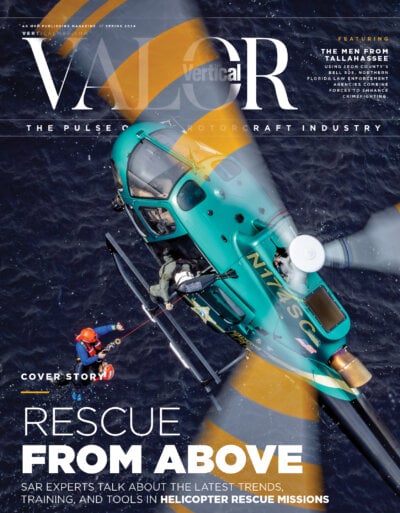With a product line that includes the Leonardo AW101 multirole helicopter and the AW159 twin-engine multi-mission platform, Leonardo UK’s Yeovil, Somerset, facility is a major rotary-wing manufacturing hub, with roughly equal division between the domestic and international markets.
The company is home to a long tradition of rotary-wing production, having inherited the old AgustaWestland brands through a 2016 merger. Recent successes include a C$1 billion (US$745.7 million) contract to upgrade Canada’s AW101/CH-149 Cormorant search-and-rescue (SAR) helicopters. It is also pitching its AW149 medium multirole helicopter for the U.K.’s New Medium Helicopter competition.
Looking to the future, the company is developing an uncrewed military VTOL demonstrator under the Proteus program, funded by the U.K. Ministry of Defence (MOD), which forms part of the rotary-wing uncrewed air system (RWUAS) technology demonstration program.
During the Defence and Security Equipment International (DSEI) exhibition, which took place in London from Sept. 12 to 15, Vertical spoke to Adam Clarke, managing director of Leonardo Helicopters UK. The executive discussed the company’s major focuses for the coming years, along with the potential for future developments in uncrewed aviation and eVTOL.
This interview has been edited for length and clarity.
Vertical: What are your major focuses at DSEI?
Adam Clarke: Most of the messaging from the helicopter business is that we’re ready to go for the U.K. MOD’s New Medium Helicopter requirement. We have an aircraft. We’ve got an end-to-end capability in the U.K. in design, development, manufacture, support and certification. We’re good to go so that when the U.K. government is ready, we have the products, we have the engineers, we have the capability to serve that campaign.
Alongside that, in the helicopter world, we’re on the back of significant orders. We’ve won a number of orders for our two predominant platforms, the AW101 and the AW159. We’ve secured export contracts across the globe for various configurations of our aircraft, including the Canadian government with their SAR helicopter. So, it’s a really positive time to be at Leonardo and it’s a really healthy business.
Alongside that, we’re talking a lot about rotary-wing uncrewed air systems, the future of aviation. In Yeovil, we have a technology demonstrator program, Proteus, looking at the future of aviation in an uncrewed environment, where aviation will be in 2030, 2040 and beyond.
Vertical: How much importance do you place on that uncrewed focus?
Adam Clarke: We want Yeovil to lead the future in rotary-wing uncrewed aviation. You can see around [DSEI] and beyond, there are lots of different platforms that exist in this area. Ours is a two- to three-ton platform, so it’s a larger platform. It’s developed in conjunction with the U.K. MOD, but it’s absolutely focused on exportability as well.
I think a mixture of different types of products could be developed in the future. You’ve got remotely piloted systems. You’ve got fully autonomous systems. You’ve also got systems that can be launched from crewed platforms of today, air launched effects. You can have crewed/uncrewed teaming. There are many different iterations of products.
When we go down the fully autonomous route, you’ve got to enable the system to have the ability to sense and avoid, so there will be a necessity for machine learning and artificial intelligence. That is going to be critical to any uncrewed system moving forward.
Vertical: What potential do you see in eVTOL more broadly?
Adam Clarke: Within the U.K. and within Yeovil specifically, we are looking at different concepts and ideas to support the Proteus program. Leonardo, as with many other companies, is certainly looking at eVTOL.
I think the reality with eVTOL at this moment in time is there are limitations. It absolutely will shape the landscape of aviation as we move forward. For me, it’s important to observe that there’s some great innovation and great IP [intellectual property] being generated in the U.K. And from a Yeovil business, a Leonardo Helicopters UK business, it is important that we benefit from and recognize what’s happening in the wider industrial landscape.
Vertical: How have you worked to advance your Yeovil facilities?
Adam Clarke: We’ve developed a Single-Site Logistics Hub, a £30-million (US$32.2-million) investment in creating one of the most advanced logistics hubs in the U.K. We’re bringing eight warehouses that we had across the portfolio into one, and that will go live quite soon. That will be quite a revolutionary support hub, but we’re also looking at other investments.
Within the helicopter business, we have significant manufacturing facilities, we do dynamic composite components, [and] we’re very much focused on advanced manufacturing. We’re researching how we stay at the forefront of manufacturing. We have an industry partnership where we’re focused on R&D in cutting-edge manufacturing. We want to use that capability to benefit our on-site manufacturing capabilities.
Vertical: How important is a local supply chain for military helicopter manufacturers today?
Adam Clarke: The Ukraine conflict has demonstrated the importance of having domestic supply chains and having agility in that supply chain. Part of that agility is having small to medium enterprises [SME] within your portfolio. We have about 250 SMEs that exist within the U.K., and across the entirety of our supply chain [comprising more than 650 U.K. suppliers]. We spent nearly £500 million [US$536.5 million] in our supply chain last year alone, and a large portion of that goes into SMEs — [around 25%].
In terms of the U.K. landscape, we need as many different suppliers as possible that are generating intellectual property in the U.K. That gives us that agility in defense moving forward. If we can help with that landscape, then all the better.





